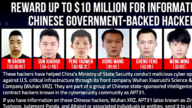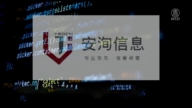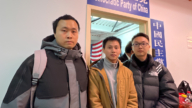【新唐人2014年08月11日訊】中共當局針對中國即時通訊使用者出臺新規定,強迫在中國使用即時通訊服務的網民要實名登記,並且要求在自己公共賬號上發佈或轉發政治新聞的網民,要事先尋求政府的批准。大陸人士說,從去年的「微博」到今年的「微信」,中共在打壓網絡的各個角落。而近來,擁有「微信」和「QQ」兩大流行通訊工具的「騰訊公司」,股票應聲下跌。
根據中共國務院信息辦公室8月7號發佈的新規限制,在中國最流行的社交媒體平臺上持有公共帳號的中國演員、歌星和其他大眾人物,不再被允許張貼或分享政治新聞。
官媒《新華社》說,在中國第一個針對即時短信服務的規定當中,「微信」公共帳號的持有人必須簽署協議,遵守所謂「社會主義制度」和「國家利益」以及其他原則。這些用戶還將被要求使用真名,並將通過背景調查確認。
大陸「騰訊公司」2011年1月21號推出「微信」。「騰訊」7號公開表示,已經從「微信」580萬個公共帳號當中,刪除了大約400個帳號,以及3000篇被認為是「散佈謠言」的文章。
而英國《金融時報》報導,在中共新規定發佈之後,擁有「微信」和「QQ」兩大流行通訊工具的「騰訊公司」,股票應聲下跌3.5%,至128.30港元。
重慶「馬甲文化傳播公司」執行長羅渝表示,這個規定目前只是針對公眾帳號,沒有針對群組和朋友之間的聊天。他認為,公共帳號相當於一個新媒體雜誌,因此這個規定相當於將新聞的審批制度移到了「微信公共帳號」。羅渝舉例說,中共當局從十多年前針對電子公告板BBS,到互聯網站,後來針對「微博」公共號,現在則針對「微信」的公共號,都是實施這樣的新聞審批制度。
重慶馬甲文化傳播公司執行長羅渝:「這個東西是一貫的做法,最早的時候它是用來管理報紙,後來移到電臺,後來對電視臺也是這樣的規定。然後每一個新媒體的產生,都會產生這樣的規定。它會比新媒體的產生滯後一段時間,一般會滯後兩年左右。」
但是北京某足球俱樂部經理孟雅春指出,中共的網路特務遍佈各個群組,包括「微信」、「微博」和「QQ群」,他們會舉報,因此中共下一步的打擊肯定是全方位的。
北京某足球俱樂部經理孟雅春:「前一段時間,已經有很多微信群被強制解散了,被銷號,沒有了。以後肯定會更多。而且我相信下一步會針對這個增加『喝茶』的頻率,在微信群,肯定會有針對性的打擊,而且我相信下一步在微信群上的名人,有影響力的重要帳號,我估計它會像對薛蠻子用這種下三濫的手段去打擊。這都是可以預見到的。」
孟雅春表示,中共對於社會嚴密全面的控制,不會放過任何一個細節。但是畢竟時代變了,他認為,現在這種網絡時代,中共還想延續過去幾十年的鐵幕統治,已經不可能了。它無法再欺騙人民。他說,習、李就是在跟時間賽跑,跟良知賽跑,跟民眾的進步賽跑。他希望習、李良心發現,在歷史上佔據一個正確的位置。
雖然新的規定瞄準的是中國國內的聊天服務,但是自從7月1號以來,一系列外國聊天應用程式在中國也被封鎖,北京聲稱,擔憂這些聊天軟件被用來煽動恐怖主義。封鎖的對像包括韓國的即時通訊應用程式Line,和韓國聊天應用程式Kakaotalk。
韓國科技部在聲明中說,「北京告訴首爾,它封鎖了一些外國短信服務,一些恐怖主義信息在通過它們流傳。」
孟雅春:「中共或者任何極權體制通常都是愚蠢的,別人知道你沒穿褲子,但是它還要裝作穿了褲子的樣子。很蠢。大家都已經習慣了,包括對推特,對臉書這種態度,都是一以貫之的。」
去年,在中共當局針對「新浪微博」進行打擊之後,用戶成群結隊的離開,「新浪」股價動盪不安。
採訪編輯/秦雪 後製/舒燦
Tencent’s Shares Fell as WeChat Becomes The CCP’s Next Media Censorship Target
The Chinese Communist Party (CCP) has released new
restrictions against users of instant messaging services.
It forcibly requires the services to impose the real-name
registration system.
Furthermore, the CCP has to approve posting or sharing
political news by netizens to their public messaging accounts.
Some Chinese comment that, from the crackdown on Weibo
last year to the move against WeChat this year,
the CCP is suppressing online speech in every aspect.
Tencent, the owner of popular communication platforms
WeChat and QQ, quickly saw a drop in stock price
after the CCP announced the new rules.
On Aug. 7, the CCP’s The State Internet Information Office
imposed new restrictions on Chinese movie stars, pop singers
and other celebrities which will not allow them to post
or share any political news on their public WeChat accounts.
The Xinhua News Agency said that this is the first ever
regulation against instant messaging services.
WeChat users with public accounts are now subject
to mandatory agreements that their posts must abide
by principles of upholding “socialism” and “state interest.”
Users are also required to use their real names to register,
which is implemented through a background check system.
Tencent Holdings Ltd. released WeChat on January 21, 2011.
Tencent said on Aug. 7 that it had deleted about 400 accounts
and 3000 “rumor-mongering” articles from an overall
of 5.8 million public WeChat accounts.
According to the Financial Times, as the owner of WeChat
and QQ, Tencent’s share fell by 3.5 percent to 128.3 HKD
($16.6) upon release of the CCP’s new rules.
Luo Yu, executive of Chongqing Ma Jia Culture
Communication Co., said the rules are against public
accounts only and do not apply to private talks for now.
Luo comments that, as public WeChat accounts work similarly
to media, the move is equivalent to extend news censorship
system to WeChat’s public accounts.
Luo said the CCP had been doing the same against BBS over
a decade ago, then websites, then Weibo and now Wechat.
Luo Yu, Executive of Chongqing Ma Jia Culture
Communication Co.: ”This is a typical move by the CCP.
Those rules were first used to control newspapers,
and later applied to radio and TV stations.
Any new media form will finally be imposed with
such restrictions.
Usually the rules are released some time
after new media forms come into being.
Usually the delay is about two years.”
Meng Yachun, a Beijing soccer club manager, comments that
the CCP’s Internet spies are found everywhere
in “WeChat,” Weibo and QQ groups.
Their job is to report “sensitive information.”
So the CCP’s crackdown comes in every aspect.
Meng Yachun, Beijing soccer club manager: “Some time ago,
many WeChat groups were forcibly disbanded
and the accounts deleted.
Things like this will occur more frequently in the future.
I believe that the CCP will bring more netizens
under police interrogation, especially against WeChat users.
I am also convinced that the CCP probably will use dirty
tricks to suppress most influential WeChat accounts and
celebrities, like what it had done against Charles Xue.
Meng Yachun comments that the CCP attempts to control
the Chinese society in every aspect without missing
any tiny places; however, the Internet era has made it
impossible for the party to keep its autocratic rule
by deceiving all civilians.
Meng said Xi Jinping and Li Keqiang were racing with time,
with their conscience and with improvement
of civilians’ wisdom.
Meng hopes Xi and Li choose to save their conscience
and leave themselves a good reputation in history.
Although the new rules are directed against Chinese
messaging services, some foreign communicating software
were also blocked in China since July 1.
Beijing claimed that they have concerns over the use
of these tools by “terrorists.”
Blocked tools include Line widely used in Japan
and KakaoTalk, a popular messaging app in Korea.
Korea’s Ministry of Science and Technology said in
a statement that, “Beijing told Seoul that it had blocked
some foreign messaging services through
which terrorism-related information was circulating.”
Meng Yachun: “The CCP or any autocratic regime is stupid.
Everyone knows that it wears no clothes, but it still pretends
to have got something on.
That is foolish.
In fact we are used to its campaign against social networks
such as twitter and facebook. There is nothing new.”
In 2013, Sina Weibo lost many users after the CCP’s
crackdown, resulting in many ups and downs
in Sina’s share price.
Interview & Edit/QinXue Post-Production/ShuCan



























